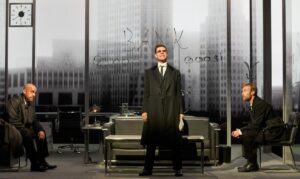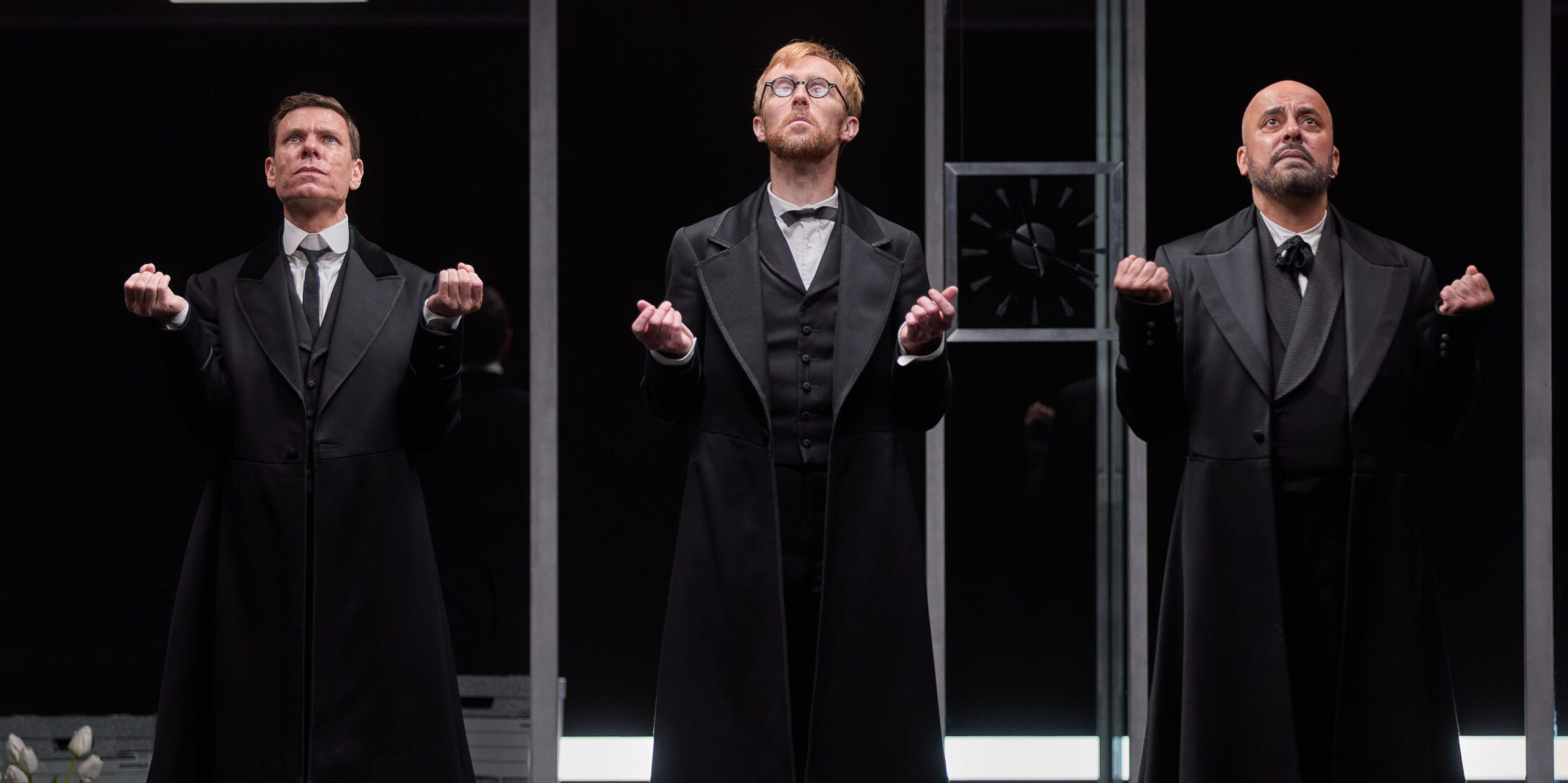Ben Power’s adaptation of Italian playwright Stefano Massini’s epic The Lehman Trilogy is just that; an epic. Chronicling the Lehman family’s immigration to America, their driving entrepreneurial spirit, and their ultimate downfall, the play clocks in at over three hours. Still, watching three actors take on a myriad of roles throughout the Lehman corporation’s history is to watch a ball that is thrown up and never dropped, even in the quietest of beats. The credit for this must first be handed to the actors themselves; John Hefferman, Aaron Krohn, and Howard W. Overshown. These three brilliant performers don’t let their unchanging costumes hinder them from becoming somebody new entirely. Each figure they take on has their own physicality, vocal inflection, and purpose. You may be watching three actors onstage, but you meet over 50 people. Pair this with Sam Mendes’ impressively dynamic staging, and you get a truly one-of-a-kind night at the theatre.
Beginning with Bavarian Jew Henry Lehman’s 1844 arrival in America, we watch as he explores a terrain which, to him, is foreign, but full of opportunity. We are quickly presented with the idealisation of the American Dream, a theme prevalent throughout. After setting up shop in Alabama, his brothers, Emmanuel and Meyer, eventually immigrate and join him in the dry goods business. Once this ball gets rolling, the Lehman’s rise (and eventual 2008 demise) happens before our very eyes, or, as much as our eyes can handle; centuries of information is not so simply shared in one night, nor is it easily depicted. Yet, set designer Es Devlin does it with ease and fluidity; a rotating glass box. In the three distinct rooms of this box, we are able to go from the small Alabama store to the New York Stock Exchange in seconds, along with the help of video designer’s Luke Halls seamless yet frantic content. Unbound by the time period of a given moment, the constant movement of both the actors and the set consistently keeps the audience engaged with the shifting times the Lehman’s flourished in.

There is still one distinct element missing from this equation (like that of the many marker drawings the actors cover the glass box in), and that is the music. Composer and sound designer Nick Powell has crafted a live piano score (beautifully played by Cat Beveridge) that becomes a fourth actor in and of itself. The haunting, sombre melodies transform into frantic building blocks. From there, the actors take over in cementing it all together into the empire they create. This empire, though, is just as fragile as the lives of the Lehman members we meet. Opening with the scene of a custodian hearing about the 2008 financial crisis, we know that whatever is built will not last forever. Through depressions, wars, and deaths, the Lehmans seem to rise above any tribulation set before them all with the simple phrase; baruch hashem. Their religious identities, though prevalent in their early success, slowly becomes detached as a new figure of worship enters: money.
This begs the question, what are we supposed to be taking away from all this? For a family that thrived through capitalism, the play certainly doesn’t shy away from their greed. For such a devout family, the play doesn’t suggest a higher being is blessing them. The most consistent element in this play is that the people we watch are just that; people. Though we watch these people fall into the pits of greed and success, Mendes is able to weave these controversial actions into natural beats of these people’s lives, while Power’s use of personal vs. factual monologues helps keep these figures relatable. Additionally, the shedding of a religious identity and taking on an All-American one is depicted with just the right amount of sardonic awareness; this play goes from religious dream to cautionary tale. Were this awareness not the case, who knows if there’d be any interest in watching these figures consistently take more than they give, even if they leave behind complex legacies. The Lehman’s may have contributed heavily to the cotton industry in their early days, but that in turn fueled slavery. While the Lehman’s may have lost their benevolence in time, this production gives a plentiful amount to the audience through its direction and performances. Somehow, after all that time, I’m still hungry for more.
Drama
The Lehman Trilogy
By Stefano Massini, Adapted by Ben Power
Music by Nick Powell
Directed by Sam Mendes
Featuring John Hefferman, Aaron Krohn, Howard W. Overshown
Until 05 January, 2025

